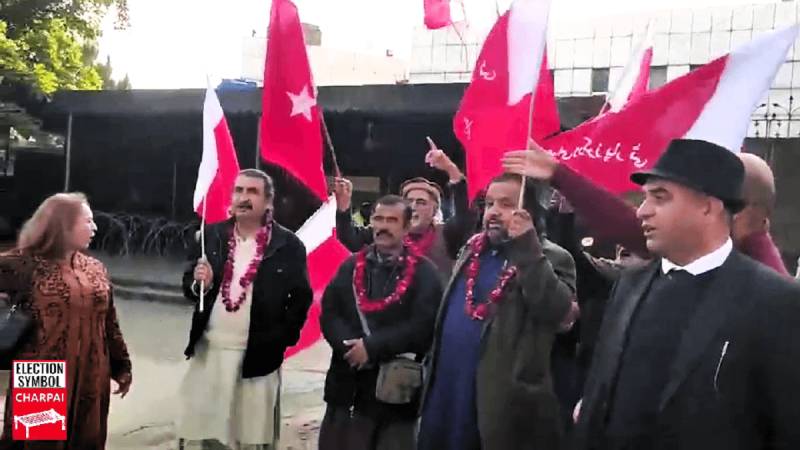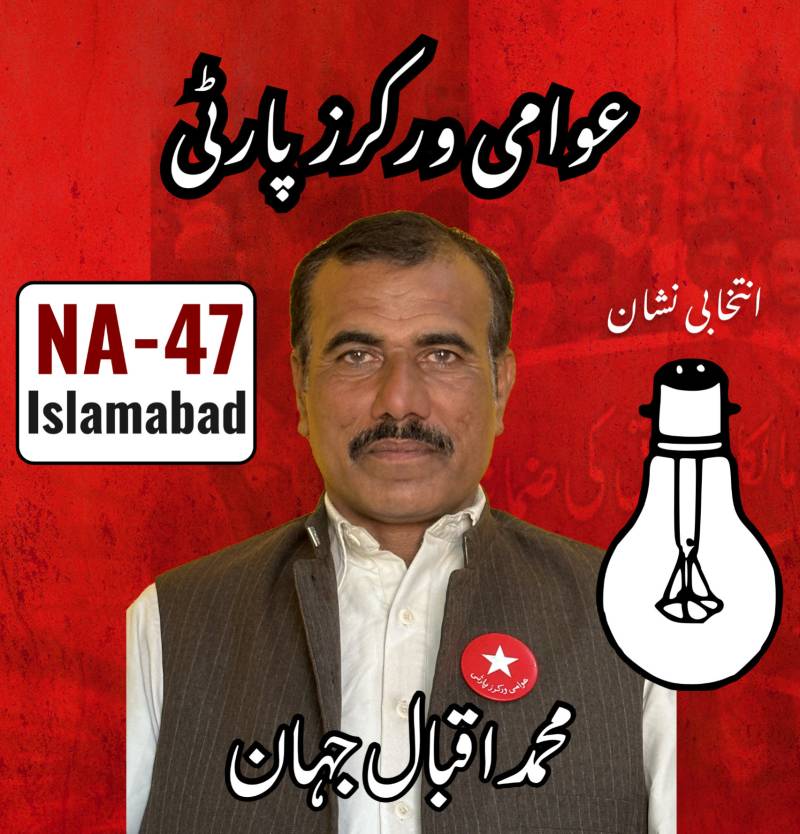
Pakistan's parliament is considered to have been captured by its elite. The last national assembly boasted one of the largest concentrations of billionaires in its history — some even became multimillionaires during their tenure. To change this trend and 'fix' the parliament so that the voice of the labour class can be raised in it, a mechanic from the opposite end of the social and political spectrum in the federal capital has set out to contest the February 8 general elections.
Meet Ustad Iqbal Jahan, a mechanic who runs an auto parts and motorcycle repair store in the heart of Islamabad. He is a candidate for NA-47 in Islamabad on a ticket of the Awami Workers Party (AWP).
The AWP is a left-wing party which claims to represent the ordinary people while adapting to the challenges posed by the 21st century. Since its formation, the party has tried to propagate progressive ideas in the Pakistani political arena. The AWP is fielding ten candidates in this year's general elections from Punjab, Sindh, Khyber Pakhtunkhwa and Islamabad.
Sitting near upsacle stores in Isalamabad's affluent Sector F-11, Jahan told The Friday Times that the AWP recognises who truly is the greatest person in society: the labourer. Jahan said the party had manifested this recognition by awarding people like him a party ticket to contest elections.
"My companions call me 'Ustad Iqbal' because I work as a mechanic, and as you know, in our profession, one starts as an apprentice and later becomes a master," he said, adding that the AWP too bestowed him with the title of "Ustad".
Fuelled by a passion to reshape the country's current policy landscape and what hte faces proposing them look like, Jahan dreams of changing that.
"It is not difficult to turn this dream into reality," he said, adding that all it takes to turn dreams into reality is to take the first step towards your destination.
"Our party workers are contesting from different cities and will become a voice for people from the lower strata of society," he hoped.

"Although Islamabad is famous for its cleanliness and natural beauty, with the hills of Kothian and Margalla truly presenting a picturesque view, the labourers who built and continue to carry this city are unable to enjoy the luxuries enjoyed by its rulers," he commented, adding that the AWP has always advocated for the rights of the labourers, struggled against the exploitation of slum dwellers and campaigned for the provision of basic necessities such as water, electricity, gas, and dignity for the ordinary people.
"We have stood with the youth, students, and those seeking employment. We have fought for the freedom of women and children," he said.
With the main focus of his campaign on fighting for the rights of the working class in the federal capital, Jahan explained that a majority of Islamabad's residents are hardworking individuals who have migrated to the federal capital from distant areas.
Initially, Jahan said people from the Potwar village came to the federal capital to build a new city and its infrastructure. Later, he said, members of the Christian community of Punjab came over and played a significant role in shaping modern-day Islamabad. Similarly, many people from the Pashtu-speaking regions came and worked in the capital markets, serving as labourers for the elite.
"I share a similar story. I came to Islamabad from Bannu and started a new life in Islamabad as a labourer," he explained, adding that eventually, he learnt to be a mechanic, and for the past few years, he has been running his motorcycle repair shop in Sector F-11.
Having seen the federal capital transformed into a melting pot of languages, ethnicities, and social strata, he believed that the politics in the city had been overtaken by a particular group hailing from a certain social class.
Our major political parties, religious groups, or the generals, who talk day and night about the national interest, have no concern for the issues of labourers, farmers, and the ordinary youth, laments Jahan.
"I will say it is all about money and power. Sometimes one [leader] comes, sometimes another, but the condition of the labourers keeps deteriorating," he complained about Pakistan's current crop of lawmakers and seasoned politicians.
Despite the tall claims of political leaders, he said that labourers in the federal capital today struggle to afford even the most basic of necessities.
"If someone lives in the slums, they cannot dream of buying a house in Bahria, DHA, or other major [housing] sectors. Now, people cannot even afford to pay rent [of small housing units]," he said.
Even though it is the government's responsibility to provide everyone with education and health facilities, now only those with money can access facilities of any quality, he pointed out.
"I would definitely raise this matter in the parliament," he said.
"The situation in Islamabad [a model city built for the rest of Pakistan to follow] is the same as in the rest of Pakistan," he lamented. He added that government institutions, including the Capital Development Authority (CDA), now work for the benefit of the upper class.
If elected, he said the AWP will prove to be different in actions to their peers.
"We say that the roots of this governing system are rotten. Fundamental changes need to be made," he said, adding, "If we want to provide jobs for the younger generation, we must rein in the real estate mafia and the land grabbers."
Identifying the scarcity of water and environmental degradation of the city as grave issues requiring urgent attention, he said the government must prioritise public transport and public housing.
In its manifesto, Jahan highlighted how the AWP talks about 'gender equality' in achieving economic, legal, social and political equality for women.
ہمارے ملک کے موجودہ اس سسٹم میں عام آدمی کی کوئی جگہ نہیں ہے کہ سسٹم جاگیردار، سرمایہ دار ،ملا اور تھانے دار کیلئے، ہم اس سسٹم کیخلاف نکلے ہیں عوام ہمارا ساتھ دے۔ یہ مفادات اور وسائل کی جنگ ہے ہم اس کو روکیں گے۔ pic.twitter.com/tXUUHAfHR3
— Naya Daur Videos (@nayadaurpk_urdu) January 27, 2024

